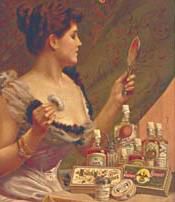Perfumes

The word perfume comes from the Latin "per fumum" which literally means "through smoke". The first perfumes were in fact, incense offerings used in rituals and in honour of the gods.
The origins of perfume are closely associated with religion in practices for purifying the soul and as offerings to the gods. The ancient Greek, Egypt and Roman civilizations highly prized aromatic plants.
In Egypt fragrances were considered sacred and it was believed that their use drew mortals closer to the gods. Much later the Greeks and Romans transformed perfumes into items for personal hygiene.
During the Middle Ages fragrant herbs and perfume oils were used to combat the many epidemics that raged through Europe. With the arrival of Christendom, its use diminished as it was associated with lack of modesty. Even so perfume continued to be used amongst the higher classes.
In the 17th century the use of perfume increased. At that time in France, it became fashionable to use perfumed gloves. France has ever since remained the centre for European research, production and perfume trade.
In the first century A.D. glass was invented which allowed for the preservation of perfumes in better conditions. Until that time, perfumes were kept in clay jars or tin flasks. At the end of the 19th century elaborative perfume bottles began to be manufactured. Perfume bottles are considered as part of the perfume industry's marketing strategy.
According to the French Perfume Committee, perfumes may be classified into 7 basic groups:

- Citric: Those obtained from citrus fruit skins such as bergamot, tangerine, lemon, lime, orange etc.
- Floral: Those perfumes whose principle theme is a flower: floral bouquet, floral green, aldehydic floral, woody floral among others.
- Fern: Perfumes with notes of lavender, bergamot, and geranium.
- Cypress: The family of perfumes whose principle notes are patchouli, bergamot and rose.
- Woody: fragrances with mild notes such as sandalwood, patchouli or dry such as cedar and vetiver. Includes fragrances with citric or lavender notes.
- Resinous: Those with mild notes of vanilla, also known as orientals.
- Leather: Characteristic perfumes with dry notes of leather, burnt wood and tobacco.

The perfume industry uses a vast and diverse quantity of raw materials. The rarity of some plant species, the laboriousness of the process and the quantity of material needed to make essential oils makes it very costly. The most utilised essential oil in the perfume industry and also one of the most costly is rose essential oil. Two tons of fresh rose petals in bloom are needed to produce 1 kg of rose essential oil.

